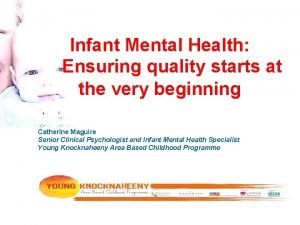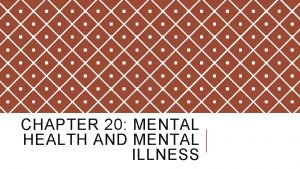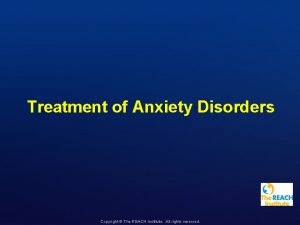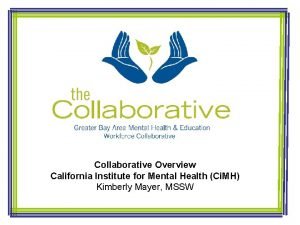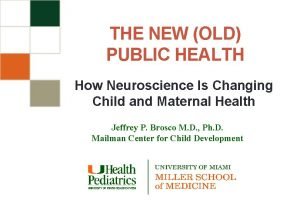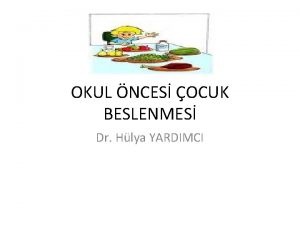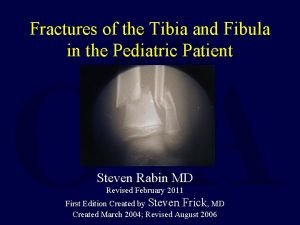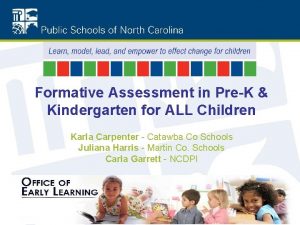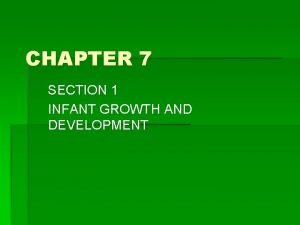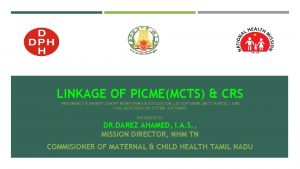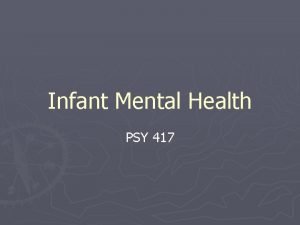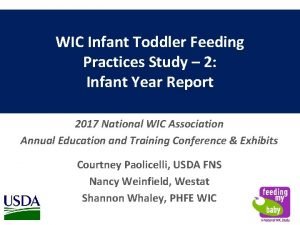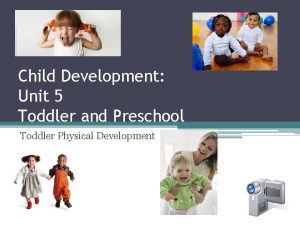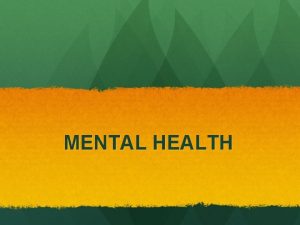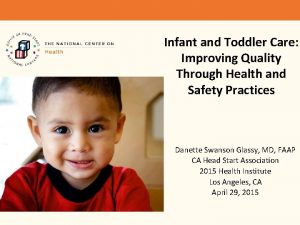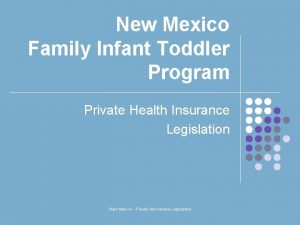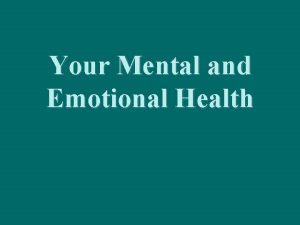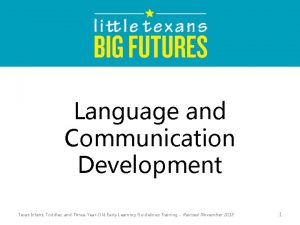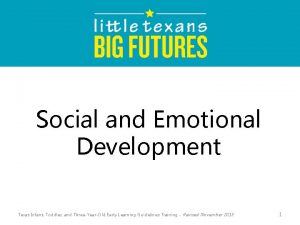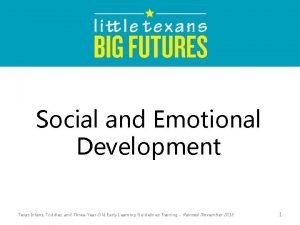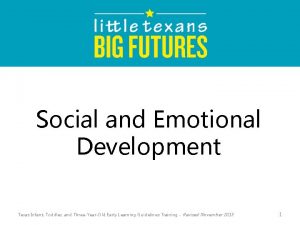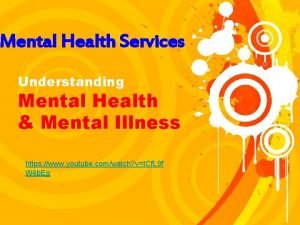Infant and Toddler Mental Health Summer Institute A





















- Slides: 21

Infant and Toddler Mental Health Summer Institute A summary report

What was it? Partnership with IAITMH, Sunny Start and Department of Mental Health l Intense training opportunity l Three sessions over a five day period l Networking opportunity l Goal was to reach out to more mental health professionals and therefore increase the workforce capacity/ resources for families l

Session One – July 9 l Mental Health Diagnosis in Young Children with Janice Katz, Ph. D ½ day session l Highlighted diagnostic criteria in the DC 0 -3 l Participants received a copy of DC: 0 -3 R l l CANS 0 -5 with Stacey Ryan, LCSW ½ day session l Highlighted the CANS tool and its use in Indiana l

Session Two – July 10 -11 l l Interaction Guidance (IG): Dyadic Treatment for High Risk Families with Susan Mc. Donough, Ph. D IG is a structured format based on systems theory along with infant mental health concepts. Videotape is used to support change in parent-child interactions IG is an evidenced-based intervention strategy Each participant received a copy of Treating Parent-Infant Relationship Problems

Session Three – July 12 -13 l l l Dialectical Behavior Therapy (DBT) for High Risk Parents with Janet Dean, LCSW DBT is an evidence-based treatment for individuals with personality problems, characterized by low reflective functioning, difficulty with self-regulation, and reduced tolerance for stress Each participant received a copy of Early Intervention with Multi-Risk Families

Participant Data Total 75 participants over the five days l Session 1 – 50 total participants l Session 2 – 52 total participants l Session 3 – 41 total participants l 27 participated in all five days of the institute l 22 different centers/organizations represented l 26 different communities represented l

Evaluation Comments Session One Now I know what to do for early mental health assessments that DCS asks me to do. Also, our facility is now using the CANS for all our child intakes. l I plan to start using the DC: 0 -3 diagnostic criteria and crosswalk with my reports and treatment with infants and toddlers. l

Evaluation Comments Session Two l l l I will be less clinical. I love the way this is strength based and goes where the client is. This gave me permissive to focus more on the client: less on the illness. I will increase my practice age range. I really want to try the video thing and I plan to be more observant and make snap shots of the positive things parents and children are doing to build better relationship. Because of this training will feel more comfortable serving younger children. Prior to this session would not have considered seeing 0 -2 year old. Learned a lot about use of self

Evaluation Comments Session Three I'll be much more mindful and less intense. l Will work more with infant ages (0 -3). l I would like to try to be more aware of structure, being in the moment, less focused on change. l I will begin to develop services for Infant toddler mental health in my community mental health center. l

What We Learned Participants appreciated attention and focus on learning environment and materials l Providers want to serve this population l Providers want more information to successful partner with children and famiilies l Useful techniques for infant and toddler mental health interventions l

Why a Relationship Approach? Infant behavior cannot be viewed apart from the child’s relationships l During infancy the most important relationships are with the primary caregivers l Caregivers have relationships with their social context; extended family, friends, cultural and spiritual networks l

Origins of Interaction Guidance Created specifically for families who were not successfully engaged in mental health treatment or refused referral l Incorporated principles of family systems and dynamic theory, the use of video technology and brief psychotherapy practice to address parent-infant relationship problems l

How we can partner with families who don’t want our help Listen to how others have treated them without trying to explain, clarify, defend, or instruct l Acknowledge and legitimize their feelings of betrayal, mistrust and disappointments l Ask, rather than assume, that they believe you can be helpful l

Where to Begin? Therapeutic “Port of Entry” Treatment approach matches Family’s needs & capabilities at this point in their family life cycle

Interaction Guidance Relationship focused l Interaction as: l Early focus of intervention l Reflection of representation l Egalitarian therapeutic relationship l Replay and reflection of interactions inviting alternative family perspective l Time-limited “piece of work” with follow -up and referrals l

Why pay attention to family and relationship? l Insights from the field of neurodevelopment: l Bruce Perry “There is no more effective neurobiological intervention than a safe relationship. ” l “It changes the brain. ” l

Three Important Discoveries Safety in relationship precedes the ability to… l Be reflective; which precedes the ability to… l Be Flexibly Responsive to one’s situation and environment l

Therapeutic approaches facilitate: Integration l Acceptance l Safety l Working with resistance/ambivalence l Change l Reflective functioning l

About “change” l Any theory of change must incorporate: Establishment of safe and trusting relationship l Gain new information and experience across domains of cognition, emotion, sensation, and behavior l The simultaneous or alternating activation of neural networks that are not integrated or dissociated l

About change: There’s more… Moderate levels of emotional arousal alternating with periods of calm and safety l The integration of conceptual knowledge with emotional and sensory experience through narratives that are co-constructed with therapist l Skills to help continue integration outside of therapeutic relationship l

What’s next? l l Create a listserv to foster communication among those who attended the Institute The Social and Emotional Training and Technical Assistance Committee is surveying providers to learn what training is currently available that addresses identified competencies Review of data to identify needs Develop plan to address training needs to further expand early childhood mental health resources
 Brigance scoring chart kindergarten
Brigance scoring chart kindergarten Drdp modified essential view
Drdp modified essential view Infant/toddler sensory profile score sheet
Infant/toddler sensory profile score sheet Catherine maguire infant mental health
Catherine maguire infant mental health Chapter 20 mental health and mental illness
Chapter 20 mental health and mental illness 2016494500
2016494500 Reach institute mental health
Reach institute mental health California institute for mental health
California institute for mental health Mental health coping skills jeopardy
Mental health coping skills jeopardy Maternal and infant health disparities
Maternal and infant health disparities Banajee list of toddler vocabulary
Banajee list of toddler vocabulary Peylonephritis
Peylonephritis Toddler dönemi nedir
Toddler dönemi nedir Gillespie fracture
Gillespie fracture Toddler fever
Toddler fever Child observation samples
Child observation samples Promoting infant health section 7-2
Promoting infant health section 7-2 Infant oral health care
Infant oral health care Infant oral health care
Infant oral health care What is visitor pre registration in picme
What is visitor pre registration in picme So cal science olympiad
So cal science olympiad Nacada summer institute
Nacada summer institute



